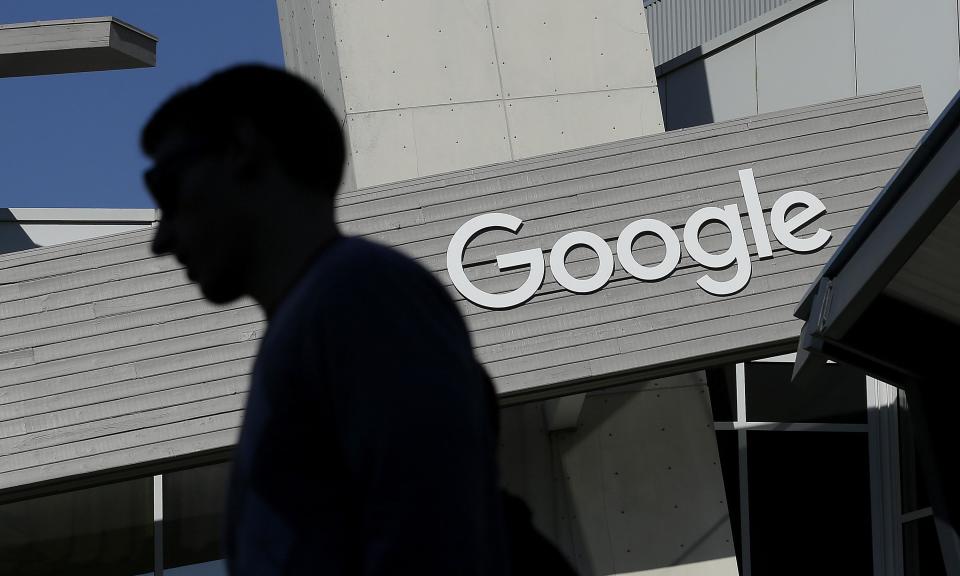Here's what the fired 'anti-diversity' engineer would have to prove in his case against Google

On Monday, Google (GOOG, GOOGL) fired the author of a notorious memo blaming the gender gap in tech on biological differences rather than bias and accusing the tech giant of alienating “non-progressives.”
The fired software engineer, 28-year-old James Damore, promptly told The New York Times that he would “likely be pursuing legal action” against his former employer. However, California, like most states, allows companies to employ people “at will,” meaning they can generally fire people without cause as long as they’re not discriminating against them.
That means your employer, unlike the government, doesn’t have to recognize your First Amendment right to free speech. Still, Damore — whose termination has stirred up a debate about self-expression at work — may have a case against the tech giant under federal labor law.
‘A call to arms’
The particular law that could apply to Damore is Section 8(a)(1) of the National Labor Relations Act (NLRA), which says your employer can’t punish you for engaging in “protected, concerted activity” such as bringing a group complaint to the attention of one’s boss. Generally, concerted activity requires two or more employees to band together and, say, complain about working conditions, says Jeffrey Hirsch, a professor specializing in employment law at UNC School of Law.
While it appears that Damore was the sole author of his 10-page internal screed, he could argue that the memo constituted a “call to arms” for certain employees, according to another employment-law professor, Matt Bodie, of St. Louis University School of Law. “The key thing you have to prove is that … it’s concerted.”
Bodie acknowledged that argument “would be a stretch.” However, he and three other employment law professors all said Damore might invoke the NLRA in a case against Google.
“His argument could be that he was seeking to initiate support among other employees about how this [Google’s culture] wasn’t good for maybe the majority of employees,” said Christine O’Brien, a professor at Boston College’s Carroll School of Management with expertise on the NLRA.
‘Illegal to retaliate’
Damore’s internal memo went viral among Google employees over the weekend, and on Saturday, Gizmodo published the full text, titled “Google’s Ideological Echo Chamber.”
The memo contained a section called “Possible non-bias causes of the gender gap in tech,” which asserted that women’s supposedly higher levels of neuroticism may “contribute to the lower number of women in high-stress jobs.” The memo also criticized a number of Google policies, including its asserted “special treatment for ‘diversity’ candidates.”

The memo prompted swift denunciation from Googlers, including those at the top. Google’s Vice President of Diversity, Integrity, and Governance, Danielle Brown, said the memo “advanced incorrect assumptions about gender,” and Ari Balogh, Google’s vice president of engineering, took issue with the memo’s “stereotyping and harmful assumptions.”
For his part, Damore says he felt attacked for expressing himself. On Monday, he filed a complaint with the National Labor Relations Board, which, he told The Times, alleged Google was “shaming” him in order to silence his complaints. He claims he was actually fired later Monday as retaliation for that complaint.
He told The Times that it’s “illegal to retaliate” against an employee for filing an NLRB complaint.
“From Google’s perspective, I’m sure they’re going to say, ‘It had nothing to do with the NLRB complaint — it was the fact that he threw a grenade in the middle of our corporate culture,” said Hirsch, the UNC law professor.
Google did not respond to the specific allegation of retaliation, pointing to a general statement from Google CEO Sundar Pichai.
“First, let me say that we strongly support the right of Googlers to express themselves, and much of what was in that memo is fair to debate, regardless of whether a vast majority of Googlers disagree with it,” he wrote. “However, portions of the memo violate our Code of Conduct and cross the line by advancing harmful gender stereotypes in our workplace.”
We reached out to Damore via LinkedIn but did not receive a response on Tuesday.
Erin Fuchs is deputy managing editor of Yahoo Finance.
Read more:
A fight over gay employees will almost certainly hit the Supreme Court
A legal fight over NYC dog sitters highlights a bigger problem in America
FTC likely to approve Whole Foods deal even if Amazon did deceive customers
